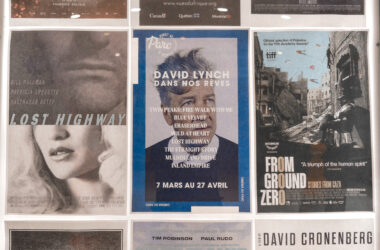
“Caution: there will be loud noises during this performance,” warns the door to Medea. The meaning of this sign came to light during the most explosive part of the play. A murder is revealed, and BAM! The back wall of the set falls down, revealing charred fabric and streams of blood.
Medea is Euripides’ classical Greek tragedy about Mithia, scorned ex-wife, and her one day of fiery revenge. Though written over two millennia ago, the story is accessible to a modern audience. Euripides is hailed as the most contemporary of the Greek playwrights—his psychological works feature empowered women, and heroes who fail to live up to their reputations.
In this case the satirized hero is Jason, captain of the Argonauts, who left his wife Mithia for a king’s daughter even though she’d killed and betrayed her country for him. The ridiculous figure (played by co-director and co-translator Andreas Apergis) seems to think the marriage will benefit Mithia and her children, but doesn’t judge the woman too harshly at first. After all, as he says, “Women get angry when their husbands remarry.”
“Angry” doesn’t suffice. Mithia, portrayed in an outstanding performance by France Rolland, begins as a dejected bundle of tears and transforms into a raging, murderous, madwoman. “You’re not a woman,” notes Jason near the end, “you’re a lioness.” Rolland manages to balance the softness of a grieving wife and mother with the frenzied actions of a woman pushed over the edge.
Beautiful, focused lighting along with an imaginative minimal set (designed by David Perrault Ninacs and Amy Keith, respectively) allow the audience to focus on the players in Euripides’ work. Granted, it takes five or 10 minutes to adjust to the heightened drama of it all. The opening monologue may seem like overacting, but it’s not. In a world where the gods rule all and revenge is best served very hot, high-strung emotion is just a fact of life.
A good deal of Medea’s impact can be attributed to its music. which was composed by Brian Lipson and directed by David Oppenheim. Live string instruments and a chorus of singers evoke the mood and meaning of each scene. The music is rembetiko—an underground Greek style, which blends folk and blues. The five women of the chorus interact with Mithia as her friends and conscious, highlighting her plight with beautiful, haunting voices.
Medea is a wonderful (and inexpensive) way to experience theatre. Parts of the production feel like Shakespeare, Mithia plotting like an ancient Lady Macbeth—but the language is much easier to understand. The production is a well-rounded, memorable, tour-de-force. I’d recommend a trip to Medea—as long as you’re comfortable with loud noises.
Medea is playing at the Centaur Theatre until Oct. 30th. More information at centaurtheatre.com








